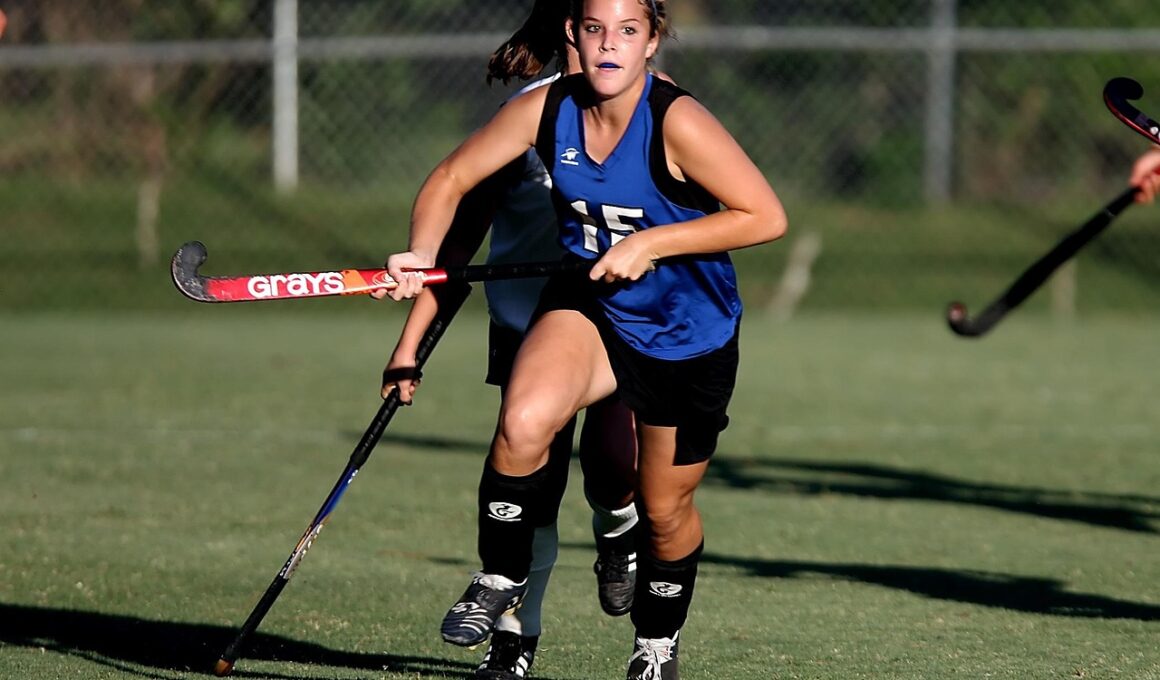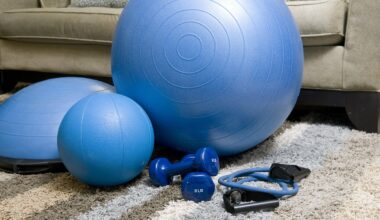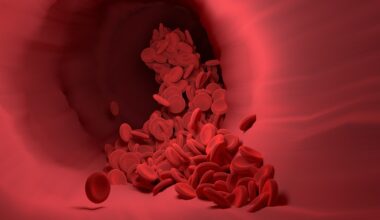Building Speed and Agility for Field Hockey Success
Field hockey coaching emphasizes the importance of speed and agility. These qualities directly impact a player’s performance on the field. Incorporating specific drills will significantly enhance these skills. Focus on agility ladder exercises, which promote foot speed and coordination. These drills lead to better on-field reactions, thus improving overall team dynamics. Training sessions should also include cone drills, which help players develop quick lateral movements. These movements are essential during game situations. Additionally, strength training is vital to complement speed. Strength exercises contribute to explosive speed, allowing players to maintain control over the ball while running. Consider integrating plyometric exercises into training routines. These exercises improve power and enhance sprinting capability. Moreover, it is crucial to monitor athletes’ nutrition. Proper nutrition fuels energy levels and should include an adequate balance of carbohydrates and proteins. Hydration is equally important, especially during intense training. Lastly, mental preparation plays a role in speed and agility. Players should visualize successful movements and practice with purpose. By focusing on all these areas, coaches can build a more agile and faster athlete, resulting in improved performance on the hockey field.
To build speed, it’s essential to understand the biomechanics of running. Coaches must educate players about proper running form, which includes posture, arm movement, and foot placement. Enhancement in speed comes from maximizing stride length and frequency. Hill sprints can also be an effective method for developing leg strength. This exercise helps teach players to push against resistance while enhancing speed. Incorporating interval training into sessions can further increase speed. Alternating between high-intensity sprints and lower-paced recovery runs develops endurance and speed simultaneously. Furthermore, players benefit from practicing quick starts. It’s crucial to teach them to explode from a standing or low position. This technique can be practiced using starting blocks or during drills like shuttle runs. Proper footwear also plays a role in achieving speed. Coaches should ensure players have the right shoes for different playing surfaces. The correct footwear provides the necessary grip while optimizing movement efficiency. Lastly, consider scheduling regular fitness assessments to track progress. These assessments help in tailoring training programs to each player’s needs. By focusing on biomechanics, strength, and drills, players can maximize their speed on the field dramatically.
Agility Drills for Field Hockey
Developing agility in field hockey involves a combination of drills that challenge a player’s ability to change direction swiftly. One highly effective drill is the T-drill, which emphasizes quick lateral movements. Players sprint, shuffle, and backpedal, enhancing their quickness and agility. Another useful drill incorporates using hurdles. Players leap over hurdles while sprinting to develop explosive movement. Cone drills can also be specifically structured to create various movement patterns, forcing players to adapt swiftly. Each setup can emphasize changes in direction, promoting agility. Developing reaction speed is crucial. Incorporate partner drills where one player makes sudden movements while the other must respond. This unpredictability challenges players to develop quick reactions. Players can also utilize agility rings or dots, which improve foot speed and coordination. Agility-based training should be varied to keep athletes engaged. Mixing up drills helps maintain interest and applies pressure similar to game situations. Coaches should remember to emphasize proper recovery and stretching after training sessions. This ensures that fatigue does not lead to injuries. In summary, implementing varied agility drills enhances skill and prepares players better for real-game scenarios by improving agility effectively.
Strength training is integral to the development of speed and agility. By focusing on building strong leg muscles, players can generate greater force when sprinting. Incorporating exercises like squats, lunges, and deadlifts into training routines can significantly enhance lower body strength. Resistance training with weights should be carefully monitored, ensuring that each player practices with correct form to avoid injury. Engaging in cross-training can also provide additional strength benefits while reducing the risk of overuse injuries. Swimming and cycling are excellent low-impact alternatives that can improve cardio fitness without straining muscles too much. Additionally, core strength is essential for overall athletic performance. Exercises like planks and medicine ball workouts build stability which aids in better balance and coordination on the field. Furthermore, periodization of strength training is essential; alternating between heavy lifting and lighter, faster workouts keeps the training balanced. Progressive resistance training assists in developing muscle strength, making players faster. Coaches should tailor these sessions to individual player’s strengths and weaknesses. Gradually increasing the intensity ensures that athletes do not plateau in their performance levels. Evaluating progress regularly will also indicate areas needing improvement and further reinforcement.
The Role of Nutrition
Proper nutrition is vital to achieving peak performance in sports coaching, particularly in field hockey. Athletes require a well-balanced diet to support their training. Emphasizing complex carbohydrates is essential, as these provide long-lasting energy for workouts and matches. Players should consume whole grains, fruits, and vegetables regularly to maintain energy levels throughout their training sessions. Protein intake is crucial for muscle recovery and development. It is recommended that athletes consume lean protein sources, such as chicken, fish, and legumes, after training. Additionally, healthy fats from sources like avocados and nuts are necessary for overall health. Hydration cannot be overlooked. Players should strive to drink sufficient water before, during, and after any training session. Dehydration can lead to performance declines and fatigue. Coaches can also educate players about nutrient timing. Consuming the right nutrients around workout times optimizes recovery and performance. Pre-game meals should focus on easy-to-digest food high in carbohydrates for quick energy release. Healthy snacks can benefit athletes significantly between games, keeping energy levels stable. Ultimately, a balanced approach to nutrition enhances overall athletic performance, making it a critical component of preparation and long-term success.
Incorporating mental training enhances speed and agility in field hockey. Visualization techniques enable athletes to mentally rehearse their movements before executing them on the field. This develops confidence, leading to improved reactions during matches. Coaches should introduce concentration exercises to strengthen players’ mental focus. Mindfulness practices help athletes stay present, reducing performance anxiety. Regularly practicing breathing techniques can calm nerves before important games. Another helpful aspect of mental training is setting goals. Athletes should create both short-term and long-term objectives to remain motivated throughout their training. Consider implementing team-building activities that enhance communication skills. Effective communication is vital for team dynamics and can lead to improved performance. Additionally, using video analysis can provide insight into areas needing improvement. Coaches can review game footage with players, highlighting both strengths and weaknesses. This analysis can foster greater self-awareness and accountability among players. Peer feedback fosters a comfortable environment for open discussion. As players learn from each other, their agility and speed improve collectively. Lastly, incorporating competition into training keeps athletes engaged and improves pressure management, emphasizing the importance of mental strength in overall athletic performance.
Conclusion: Emphasizing Holistic Development
In conclusion, building speed and agility for success in field hockey involves a comprehensive approach that addresses physical and mental aspects. Coaches must weave together strength training, agility drills, nutrition, and mental resilience for developing well-rounded athletes. Each component plays a significant role in enhancing overall performance. By focusing on individualized training plans that cater to each player’s unique abilities, coaches can maximize their athletes’ potential. Engaging players in their development is essential, as motivated athletes tend to perform better. Team cohesion improves through shared training goals and fostering a supportive environment. Regular assessments ensure that athletes are progressing and allow coaches to adjust training methods as necessary. By integrating variety in drills and exercises, training remains fresh and exciting, keeping players engaged. Coaches should also remain informed on new training techniques and scientific insights. Incorporating recent developments in sports science can further enhance training efficacy. Additionally, fostering a positive mindset encourages resilience, adaptability, and determination in athletes. As players embrace the multifaceted nature of their training, their speed and agility will flourish, ultimately leading to greater success on the field and enhanced teamwork during competitions.
In summary, coaching for speed and agility in field hockey demands a multifactorial approach. Each session can encompass variety and purpose if focused on agility, strength, and nutrition while incorporating mental training techniques. Coaches and athletes can work together to navigate the process, emphasizing development at both the individual and group levels. Through consistent evaluation, improvement opportunities can continuously arise. Athletes equipped with skills in speed and agility become game changers on the field. Preparing them holistically allows for sustained development and success in their sporting careers. Coaches should remember that fostering a growth mindset influences training outcomes significantly. As players grow in their capability, they’ll dynamically contribute to their teams, leading to success over the long term. Establishing routines that include these aspects ensures comprehensive skill-building and reinforces a culture of excellence. Field hockey can serve as more than just a sport; it can be a tool for personal development and teamwork. Through dedication, commitment, and focused training, the potential within athletes can be realized fully. Ultimately, coaches play a critical role in this journey by guiding athletes through transformative experiences that cultivate speed, agility, and overall performance, ensuring they excel in field hockey.


